Have you ever tested your VPN service or noticed the IP address you were assigned after connecting to a server? If you have, chances are you saw a different one the next time you looked. There’s a simple reason for this. The vast majority of VPN providers offer dynamic addresses, which change regularly. The alternative? An IP address that remains the same over a long period.
This article will discuss the best VPNs with a static IP feature. As you can imagine, renting one has quite a few benefits. Still, only a few providers offer it so far. We’ve tested each one and narrowed it down to the five best choices. The shortlist is below; full reviews are right after it. Read on for more information.
Best VPN With Static IP – Our 5 Favorite Options
If you’re in the market for a service with static/dedicated IP, these are the VPN providers you should check out.
7492 servers
118 covered countries
30 days money-back guarantee
10 simultaneous connections
3000 servers
105 covered countries
30 days money-back guarantee
8 simultaneous connections
12000 servers
100 covered countries
45 days money-back guarantee
7 simultaneous connections
3000 servers
100 covered countries
30 days money-back guarantee
Unlimited connections

27000 servers
91 covered countries
30 days money-back guarantee
Unlimited connections
This feature is a paid add-on for many VPNs, so you should be ready to budget extra money in addition to the regular subscription. Consider this when making a decision. Let’s get down to it.
1. NordVPN
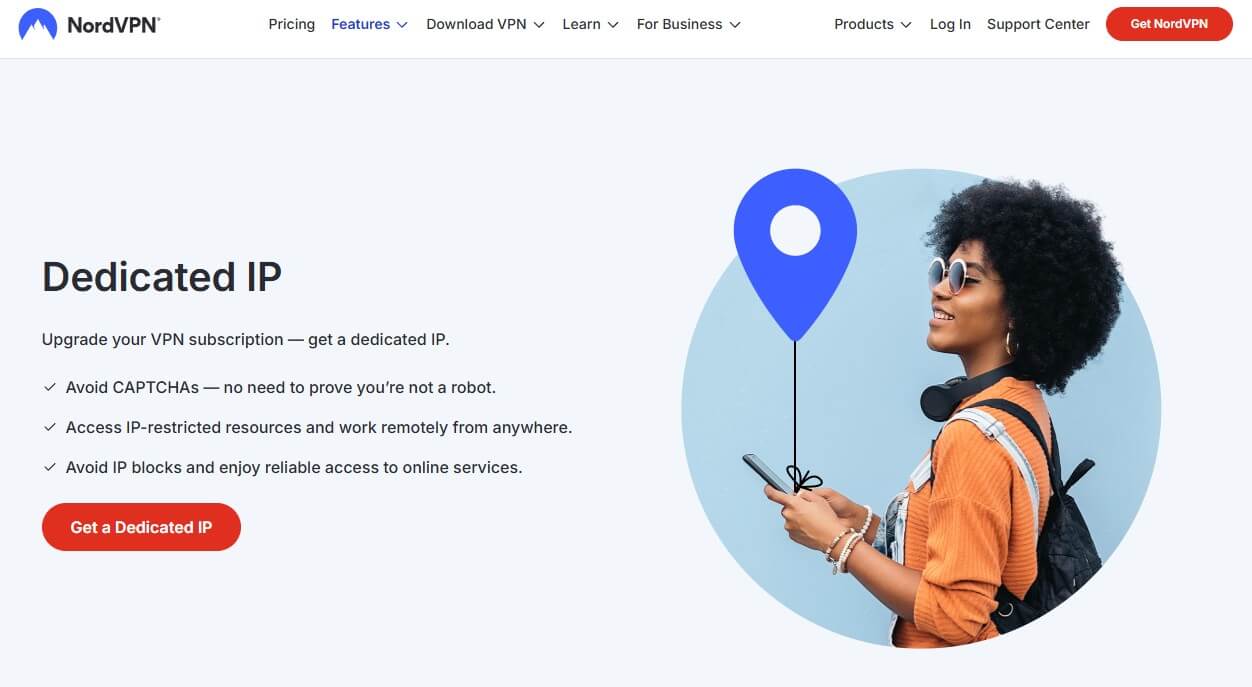
Pros
- Dozens of static IP locations
- Affordable biennial plans
- The fastest dedicated IP speeds
- No-logging policy
- Double VPN feature
Cons
- Ad-blocking is a paid extra
- Pricey monthly plans
NordVPN is a leading VPN provider known for its comprehensive security features and service reliability. With 7,900+ servers in 125+ countries, you get many options for a global reach and optimal online privacy. We like the array of locations available for NordVPN’s static IP.
They include cities in the US, Canada, the United Kingdom, Germany, France, the Netherlands, Japan, and many more. Recently, the provider added cities in Italy, Sweden, Australia, Switzerland, Hong Kong, and Spain. It is comfortably the most extensive range of static IP locations on this list.
As it widens its global reach, we expect NordVPN to add locations in South America, as South Africa is already on the list. NordVPN’s static IP address starts at around $4.2 monthly in the initial promotional deal. It’s about $9, a lot higher if you pay monthly.
You can use the feature on multiple devices — one NordVPN subscription will cover up to ten devices simultaneously. Alongside the static IP address, you get robust features to keep your location and online activities safe and private.
NordVPN has an iron-clad logless policy, verified three times via independent audits. Its standard and advanced features include bank-level encryption, a kill switch, leak protection, Double VPN, and more. In addition, the VPN boasts blazing-fast speeds and will unblock geographical restrictions on any streaming service you throw at it.
A 30-day money-back guarantee will let you test out NordVPN risk-free.
2. ExpressVPN
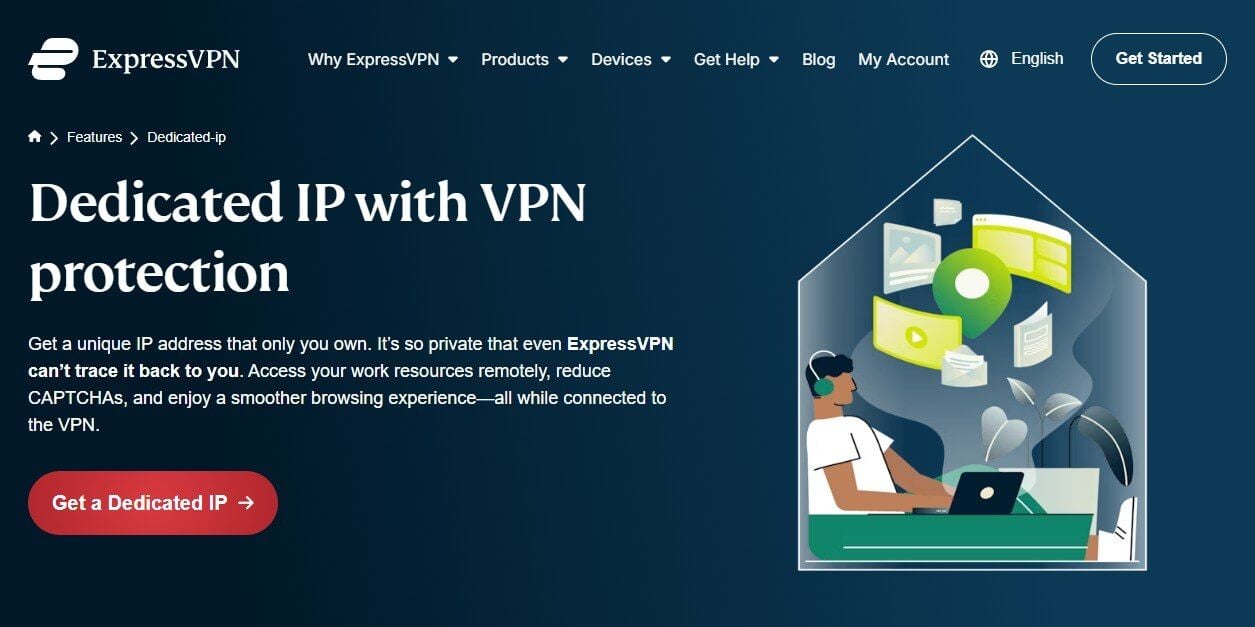
Pros
- Thirty dedicated IP locations
- 10 Gbps servers built for speed
- Ad-blocking in all plans
- Elementary VPN apps
- Great for streaming
Cons
- It could be less expensive
- Light customisation
ExpressVPN offers many static IP addresses to try in 2025.
ExpressVPN offers dedicated IP addresses in about thirty locations. Its country spread (for dedicated IPs) includes Australia, the USA, the UK, Spain, France, Hong Kong, Ireland, Portugal, Singapore, South Africa, and more. It’s among the best picks overall.
While ExpressVPN is usually not the most affordable VPN, its dedicated/static IP addresses are inexpensive. For example, the 24-month plan, with 61% off and four free months, allows you to get a static IP VPN address for $3.99 monthly. Otherwise, it’s $8.99 monthly.
With a price of dedicated IPs similar to NordVPN, ExpressVPN offers virtually the same qualities. You can enjoy unlimited traffic, industry-leading speeds, streaming, torrenting, and reliable performance. ExpressVPN isn’t as advanced as NordVPN, but its features are great.
For instance, it uses Lightway Turbo, an in-house protocol built for speed and security. Ad-blocking is part of every plan, and extras like a dark web monitor, ID theft protection, and others exist. ExpressVPN provides applications for all devices and operating systems.
Eight simultaneous connections cover everything, while 24/7 support helps if you get stuck in the mud. We’d like to see MultiHop and more customisation, but ExpressVPN is one of the best VPNs with static IP addresses as it is. Grab the discount below and get started today.
3. CyberGhost
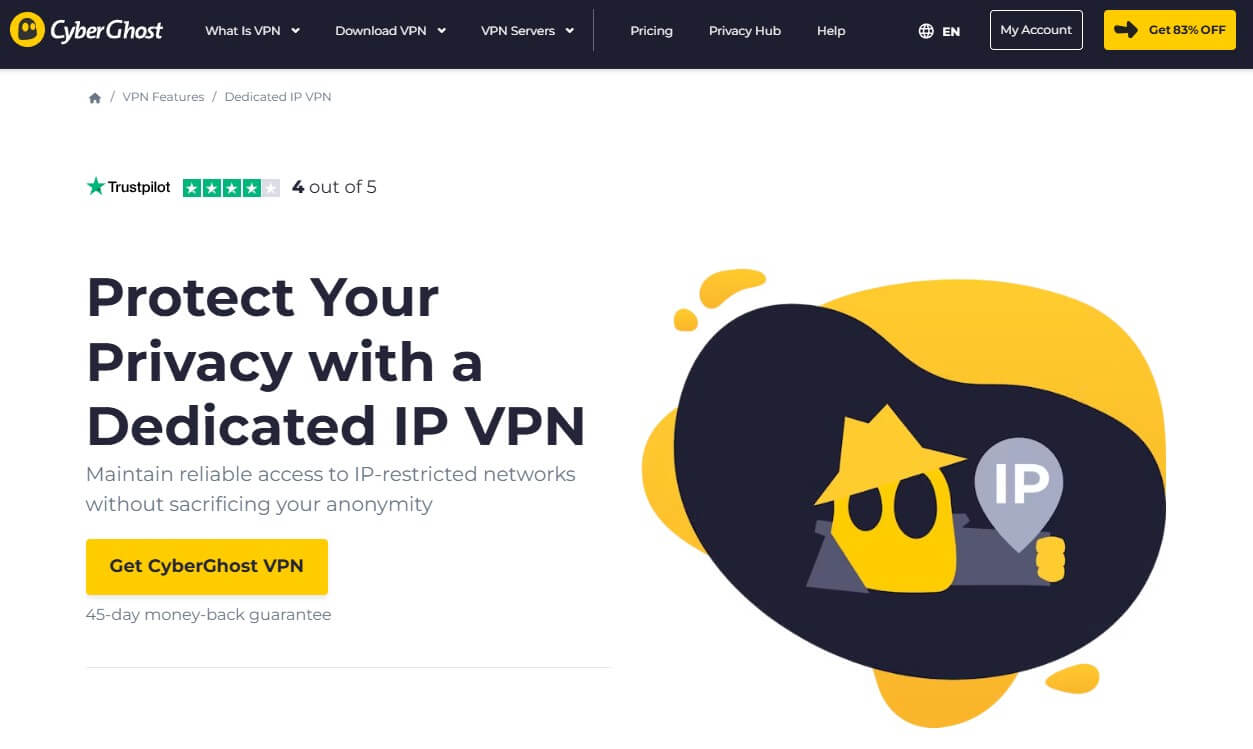
Pros
- The cheapest static IP ($2.50)
- NoSpy servers for more privacy
- Applications for all devices
- 45-day money-back guarantee
Cons
- Seven concurrent connections
- No obfuscation
While it’s a budget service (well, at least when you consider long-term plans), CyberGhost’s range of features, performance, and reliability make it one of the best VPN options on the market.
CyberGhost’s static IP is exclusively yours and stays the same across all the apps you’re using simultaneously. The VPN lets you use seven devices simultaneously on one account, an industry average.
Don’t worry about leaving breadcrumbs leading back to you. Not even the provider knows what dedicated IP you’ll use. That’s because it uses a mechanism where the IP address links to a random token you generate when you pay for the add-on. You must only activate the token once in your connected apps and get complete access.
To make sure there’s no chance that even that random token gets linked to you, CyberGhost wipes the information from its servers. That follows the VPN’s no logs policy, which Deloitte has independently audited. On top of that, CyberGhost offers the industry’s finest range of privacy and security tools.
AES 256-bit encryption, an automatic kill switch, leak protection, NoSpy servers, and other features protect your data. If you plan to use a static IP for streaming, you’ll be pleased to know that the provider shines in this area. It can unblock geo-restrictions on Netflix, Hulu, BBC iPlayer, Disney+, and many other streaming platforms.
For $2.50 monthly, you can get a CyberGhost static/dedicated IP address in the US, Germany, Belgium, Switzerland, Singapore, Sweden, Japan, the UK, Canada, or France. For subscription plans over six months, you get a 45-day money-back guarantee to try the service out.
4. Surfshark
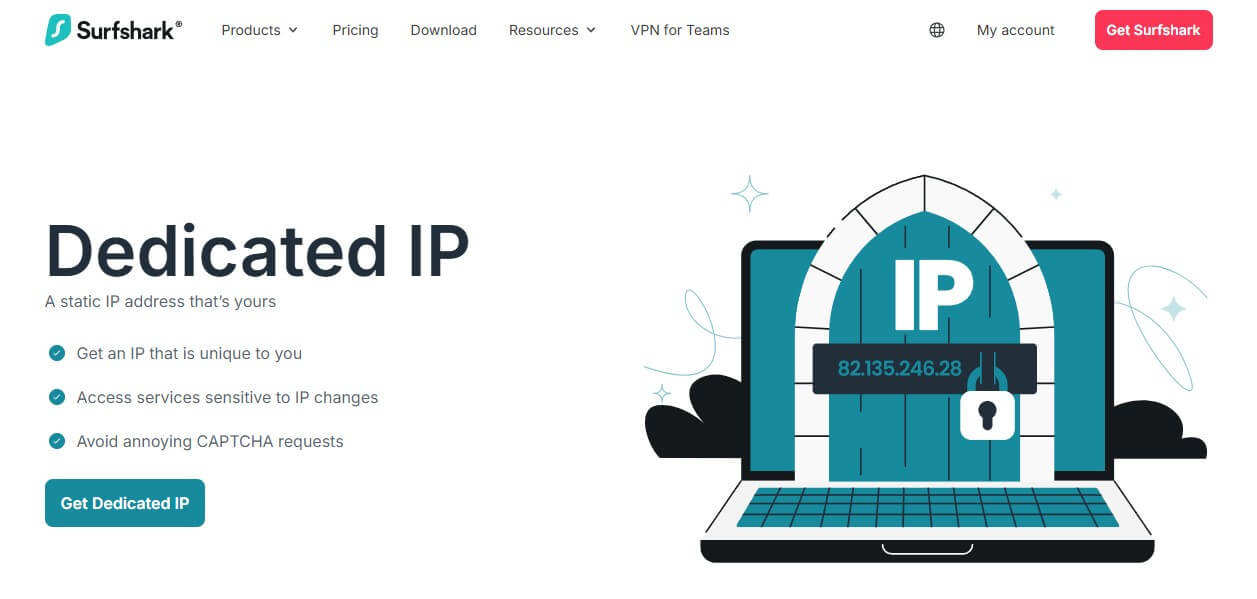
Pros
- Unlimited simultaneous connections
- Many security features
- The best option for streaming
- Antivirus for all devices
Cons
- Expensive dedicated IPs
- The Starter plan lacks some features
Surfshark’s affordable pricing plan belies the quality of its service. While it only recently rolled out the feature, Surfshark is in our list of the best VPN with static IP because the option joins an impressive lineup.
Surfshark’s dedicated IP locations are in the United States, the United Kingdom, Germany, the Netherlands, South Africa, and others. However, the provider states that location availability is subject to change, and we’ll likely see more soon.
You’re not limited to the major platforms. Surfshark makes using a static IP with all your devices, including routers and Internet-of-Things (IoT) devices, easy. Its website has configuration files for manual connections that you can download.
There’s more to sweeten the deal. Surfshark joined a group of generous VPN providers with unlimited device connections as part of its recent upgrades. It’s not the fastest, but you can expect decent speeds connected to any of Surfshark’s 3,200+ servers.
However, streaming is one area where this VPN impresses, easily unblocking access to Netflix, Disney+, BBC iPlayer, and other libraries. In addition, Surfshark is no slouch for keeping your online activities private. Its bag of standard and advanced features is enough to rival any of the top options in the market.
High-level encryption, a kill switch, and a strict zero-logs policy aside, we’re happy to see features like obfuscation and anti-malware. A 30-day money-back guarantee gives you enough time to decide about Surfshark. In addition to the subscription price, the static VPN IP costs an extra $3.75/month.
5. Private Internet Access
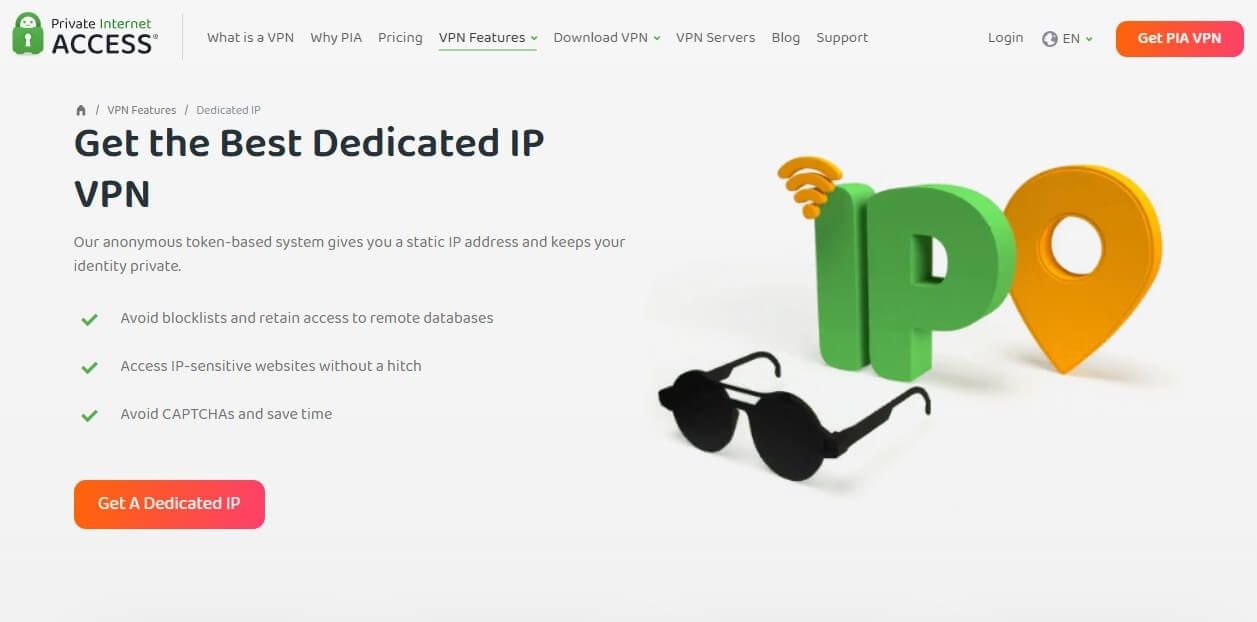
Pros
- A vast dedicated IP country spread
- Robust privacy features
- WireGuard VPN protocol
Cons
- No native app for Fire Stick TV
- Not the fastest speeds
Like CyberGhost, PIA strives to keep your dedicated IP information as tight as possible and has no idea which one is assigned to you. It also uses a token-based system that does not link the IP address to your PIA account, keeping the process anonymous.
It’s simple. Select any of its plans to subscribe to and throw in the dedicated IP as an add-on. It starts from $2.50/month. After finalising the order, you can redeem the random token when logging into your PIA account on any provider’s apps.
There’s no option to rent more than one, so you must repeat the process if you need multiple static IP addresses. PIA does not guarantee that the add-on will help you bypass geo-blocks on streaming services. That’s unsurprising. Our Private Internet Access review shows it’s hardly the best streaming provider.
If that presents a significant sticking point, check out our best VPNs for streaming for alternatives. However, there are other things to like about PIA. Its server fleet is absolutely humongous, doubling in size in a couple of years to nearly 30,000+ in 91 countries.
The static IP locations are in the US, UK, Canada, Germany, Australia, and over 20 other locations. As for privacy and security, it has you covered. Its strict logless policy has undergone multiple independent audits and has been proven twice in court.
On top of that, you get an array of protocols, advanced encryption (you even get to choose what level), a kill switch, an ad-blocker, and open-source apps. If you want to try this VPN risk-free, its refund policy backs you up for a month.
What Is a Static IP?
A static IP address is a fixed numerical label assigned to a device or network. It is manually configured and does not change unless manually modified. A static IP remains the same over an extended period.
That contrasts sharply with dynamic IPs, which can change each time a device connects to the internet. Most VPNs offer dynamic IP addresses by default, which explains why you’ll observe a different IP each time you connect to a VPN server.
You share that address with several other users who happen to be connected to the same server. A static IP address doesn’t necessarily mean you get exclusive access. There are two types: shared and dedicated static IP.
The former gives you a fixed IP address, which you share with other users, as the name suggests. Dedicated IPs are more personal. They are assigned to you alone and do not change regularly.
Benefits and Shortcomings of Static IP
A static IP address ensures consistent and uninterrupted remote access to devices or networks. It provides a reliable access point whether you need to connect to your home or office network, access files, or control devices remotely.
In theory, they are also great for bypassing geo-restrictions by streaming providers. That’s because platforms like Netflix constantly seek out IP addresses assigned to VPNs and blacklist them. If you share an IP address with others, many of whom will try accessing streaming platforms, it’s easier for the service to identify and block it.
Your streaming experience has more to do with how good your provider is. That explains why NordVPN is better at unblocking Netflix and other platforms than most competitors with a static IP feature.
In addition, you significantly decrease the chances of being flagged as suspicious or subjected to the inconvenience of completing repetitive checks. A static IP allows you to enjoy a smoother online experience, free from annoying CAPTCHA prompts.
However, dynamic IPs have a distinct advantage over static IPs. Tracing online activities back to a specific user is significantly more difficult, as many people use them. Furthermore, you have to pay for them. If price is a significant consideration, paying for an add-on on top of a VPN subscription may be too much.
Summary
There are positive and negative points to masking your real IP address with one that does not change. For instance, you avoid pesky CAPTCHA checks on websites and blacklisting by streaming services. On the flip side, you’re risking a slightly less private connection that you have to pay more for.
Ultimately, whether or not you should opt for this feature depends on your preferences. If you decide to try it, this article showcases the five best VPNs with static IP addresses to narrow your options.
FAQs
Is static IP faster than dynamic IP address?
No, there is no significant difference in performance between a static IP and a dynamic IP. The speed results depend on other factors, such as distance to the connected VPN server and your encryption and tunnelling protocol choices.
Is static IP safer to use?
No. On the one hand, using a static IP address means that you’re free from the harmful neighbour effect, where activity by other users could be in legal grey areas. However, in theory, it also means that hackers or other actors can more easily track you when you have a personal IP address.
What free VPN has a static IP?
Static IP addresses are usually paid add-ons offered by premium VPN services. No free provider currently offers this feature, which is another reason why free VPNs are generally inferior to paid VPNs.